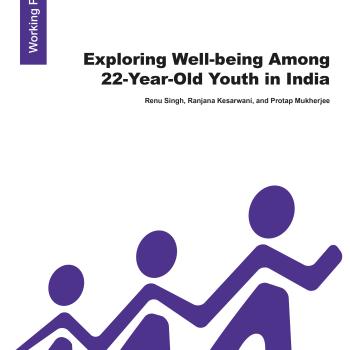Publication Information

Summary
Well-being is a multi-dimensional construct integrating physical, cognitive and socio-emotional dimensions of an individual. It refers to both objective measures of well-being as well as the subjective perceptions of an individual related to their circumstances. Concepts of poverty and well-being are closely intertwined. It has often been observed that economic development does not always translate into human development and well-being. Therefore, the measurement, tracking and promotion of well-being, especially the well-being of youth (aged 15-24) who constitute 19.1 per cent of India’s population, has grabbed the attention of policymakers.
This working paper presents a composite index that quantifies levels of well-being among 22-year-old young adults in India. The index is composed of 13 domains captured through 51 indicators. Applying the index to the Young Lives Older Cohort reveals that seven out of ten young adults have well-being that is below the mean. Analysis also reveals that psychosocial well-being in terms of inclusion, agency, self-esteem and stress are areas of concern, with many young adults reporting low scores for these indicators. This validated well-being index for youth aged 22 could potentially be used as a powerful tool to influence and inform youth-based policies.

Summary
Well-being is a multi-dimensional construct integrating physical, cognitive and socio-emotional dimensions of an individual. It refers to both objective measures of well-being as well as the subjective perceptions of an individual related to their circumstances. Concepts of poverty and well-being are closely intertwined. It has often been observed that economic development does not always translate into human development and well-being. Therefore, the measurement, tracking and promotion of well-being, especially the well-being of youth (aged 15-24) who constitute 19.1 per cent of India’s population, has grabbed the attention of policymakers.
This working paper presents a composite index that quantifies levels of well-being among 22-year-old young adults in India. The index is composed of 13 domains captured through 51 indicators. Applying the index to the Young Lives Older Cohort reveals that seven out of ten young adults have well-being that is below the mean. Analysis also reveals that psychosocial well-being in terms of inclusion, agency, self-esteem and stress are areas of concern, with many young adults reporting low scores for these indicators. This validated well-being index for youth aged 22 could potentially be used as a powerful tool to influence and inform youth-based policies.

